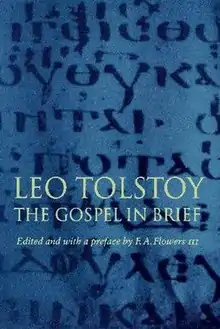The Gospel in Brief
The Gospel in Brief (Russian: Краткое Изложение Евангелия) is a 1902 synthesis of the four gospels of the New Testament into one narrative of the life of Jesus by Russian author Leo Tolstoy.[1]
 | |
| Author | Leo Tolstoy |
|---|---|
| Original title | Краткое Изложение Евангелия |
| Translator | Isabel Florence Hapgood |
| Country | Russia |
| Language | Russian |
| Genre | Religion |
Publication date | 1892 |
| Media type | |
| Pages | 215 |
| ISBN | 0803294328 |
| Text | The Gospel in Brief at Wikisource |
Included in a larger volume in 1892, the 1902 account published as The Gospel in Brief is notable in that it excludes many of the supernatural aspects of the original gospels, such as their claims of Jesus's divine origins and ability to perform miracles. Instead, the work focuses on Jesus's teachings to his followers, presumably those which Tolstoy found most compelling. The Gospel in Brief is thought by some to be deeply reflective of Tolstoy's own interpretation of Christianity.[2]
The Gospel in Brief is said to be the result of Tolstoy's close study of the original Koine Greek New Testament.[3]
The account presented in Tolstoy's gospel is also notable in its sharp contrast with the contemporaneous views of the Russian Orthodox Church. Tolstoy was a fierce critic of the Russian Orthodox Church, which went so far as to excommunicate him for his writings on Christianity in 1901.[4]
History
In 1892, Tolstoy published A Translation Harmony and Analysis of the Gospels. Concerned that the complexity of this volume would alienate it from laypeople, Tolstoy collected just the introductions and summaries of the 12 chapters of A Translation Harmony. This much shorter volume was published in 1902 as The Gospel in Brief.[5]
Influence
Austrian-British philosopher Ludwig Wittgenstein was profoundly influenced by The Gospel in Brief, which he described as a "magnificent work." After stumbling upon the book in a Polish bookstore, Wittgenstein carried the book around with him "constantly, like a talisman."[6] He took the book with him into World War I, recommending it to fellow soldiers. Wittgenstein's enthusiasm about the book during this period was so great that he became known as the "man with the Gospels" among the soldiers.[7] In a letter to Ludwig von Ficker, Wittgenstein wrote:
"Are you acquainted with Tolstoy's The Gospel in Brief? At its time, this book virtually kept me alive... If you are not acquainted with it, then you cannot imagine what an effect it can have upon a person."[8]
Some modern scholars even hypothesize that the 12-part organization of The Gospel in Brief influenced the numbering layout of Wittgenstein's landmark philosophical work, the Tractatus Logico-Philosophicus.[6]
In popular culture
In 2014, playwright Scott Carter wrote The Gospel According to Thomas Jefferson, Charles Dickens and Count Leo Tolstoy: Discord, a play that depicts Thomas Jefferson, Charles Dickens, and Leo Tolstoy stuck in purgatory together, as each of the three men wrote his own interpretation of the Gospels (Jefferson wrote The Life and Morals of Jesus of Nazareth and Dickens wrote The Life of Our Lord).[9] In the play, the trio must come to a theological agreement before they are allowed to enter heaven.[10]
See also
References
- Mader, Eric (2007). "Tolstoy's Gospel". NecessaryProse.com. NecessaryProse.com. Retrieved 16 November 2017.
- Flowers, F.A. (June 1997). "Introduction to the Gospel in Brief". Nebraska Press. Nebraska Press. Retrieved 28 July 2017.
- Kalashnikov, Alexander (20 June 2014). "Leo Tolstoy's translation of Gospels in light of 20th century translation studies". Sendebar. 25: 108–122. ISSN 2340-2415.
- Bartlett, Rosamund (2011). Tolstoy: A Russian Life. Houghton Mifflin Harcourt. p. 289. ISBN 978-0151014385.
- Shubin, Daniel (2009). Leo Tolstoy and the Kingdom of God within You. Daniel H. Shubin. p. 23. ISBN 978-0966275711.
- Westergaard, Peter (2009). "A Note on Wittgenstein's Tractatus and Tolstoy's Gospel in Brief". Wittgenstein Repository. Wittgenstein Repository. Retrieved 28 July 2017.
- Schardt, Bill; Large, David (2001). "Wittgenstein, Tolstoy and the The Gospel in Brief". The Philosopher. 89 (1).
- Monk, Ray (1991). Ludwig Wittgenstein: The Duty of Genius. London: Penguin Books. p. 116. ISBN 9780140159950.
- Jones, Chris (15 May 2016). "In smart 'Gospel,' Jefferson, Dickens and Tolstoy duke it out in hell". Chicago Tribune. Tronc, Inc. Retrieved 16 November 2017.
- Ritzel, Rebecca (25 March 2016). "Jefferson, Dickens and Tolstoy walk into a church basement..." Washington Post. WP Company LLC. Retrieved 16 November 2017.